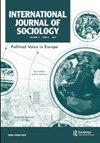Contribution of Family Support in Addressing Children Streetism in Dar Es Salaam and Dodoma Cities
IF 1.8
Q2 SOCIOLOGY
引用次数: 0
Abstract
Purpose: Tanzania has been implementing several initiatives to address the challenge of street children in the country. Despite such efforts, the child streetism has become the daily reality and has shown the sign of increasing. This dissertation is a study on the influence of poverty and family support on child streetism in urban Tanzania. Specifically, the paper focused on analysing the lived experiences of street children; describing the influence of the family support on children streetism. Methodology: The paper adopted interpretivism research paradigm using descriptive cross-sectional design and inductive research approach. It involved a total of 38 informants who were purposively selected while the snowballing sampling technique was used in accessing street children. Semi-structured interview, documentary review and observation method were conducted. Findings: Through thematic and content data analysis techniques, this study reveals that street children experienced difficulties in getting their basic needs and did not easily access health services when they fell sick. They also engaged into intra-violence among themselves. Further, child streetism has been largely influenced by lack of family support. Lack of family support included unwillingness of parents and guardians to carter for the needs of their children, single parenting and poor orphaned families with limited economic opportunities, abusive parenting and, absence of love and care to children i.e. child neglect. Unique Contribution to Theory, Practice and Policy: These negative consequences of inadequate family support were attributed by substance abuse and use by parents and guardians, family violence incidences including gender-based violence, death of one or all parents, relatives’ thirsty in confiscating family properties when the death of male parent occurs.家庭支持对达累斯萨拉姆和多多马市解决儿童街头歧视问题的贡献
目的:坦桑尼亚一直在执行若干倡议,以解决该国街头儿童的挑战。尽管做出了这样的努力,但儿童街头暴力已经成为日常现实,并有增加的迹象。本文旨在研究贫困和家庭支持对坦桑尼亚城市儿童街头行为的影响。具体而言,本文侧重于分析街头儿童的生活经历;描述家庭支持对儿童街头行为的影响。研究方法:采用描述性横断面设计和归纳研究法的解释主义研究范式。在接触街头儿童时采用滚雪球抽样技术,有目的地选择了总共38名举报人。采用半结构化访谈法、文献回顾法和观察法。研究结果:通过主题和内容数据分析技术,这项研究表明,街头儿童在获得基本需求方面遇到困难,并且在生病时不易获得保健服务。他们之间也发生了内部暴力。此外,儿童街头歧视在很大程度上受到缺乏家庭支持的影响。缺乏家庭支持包括父母和监护人不愿意照顾子女的需要、单亲父母和经济机会有限的贫穷孤儿家庭、虐待父母以及缺乏对儿童的爱和照顾,即忽视儿童。对理论、实践和政策的独特贡献:家庭支助不足造成的这些消极后果是由于父母和监护人滥用和使用药物、包括基于性别的暴力在内的家庭暴力事件、父母一方或全部死亡、亲属在父亲死亡时急于没收家庭财产。
本文章由计算机程序翻译,如有差异,请以英文原文为准。
求助全文
约1分钟内获得全文
求助全文

 求助内容:
求助内容: 应助结果提醒方式:
应助结果提醒方式:


